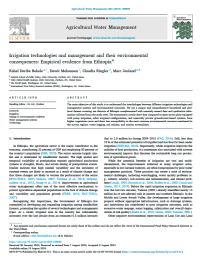Journal Article - August 2024
Irrigation technologies and management and their environmental consequences: Empirical evidence from Ethiopia
The main objective of this study is to understand the interlinkages between different irrigation technologies and management systems and environmental outcomes. We use a unique and comprehensive household and plot-level dataset covering ten districts of Ethiopia complemented with remotely sensed data and qualitative information collected from the study sites. The econometric results show that compared to open-access plots equipped with pump irrigation, other irrigated configurations, and especially private groundwater-based systems, have higher vegetation cover and show less susceptibility to the most common environmental concerns mentioned in the survey regions: water logging, soil salinity, and erosion externalities.
